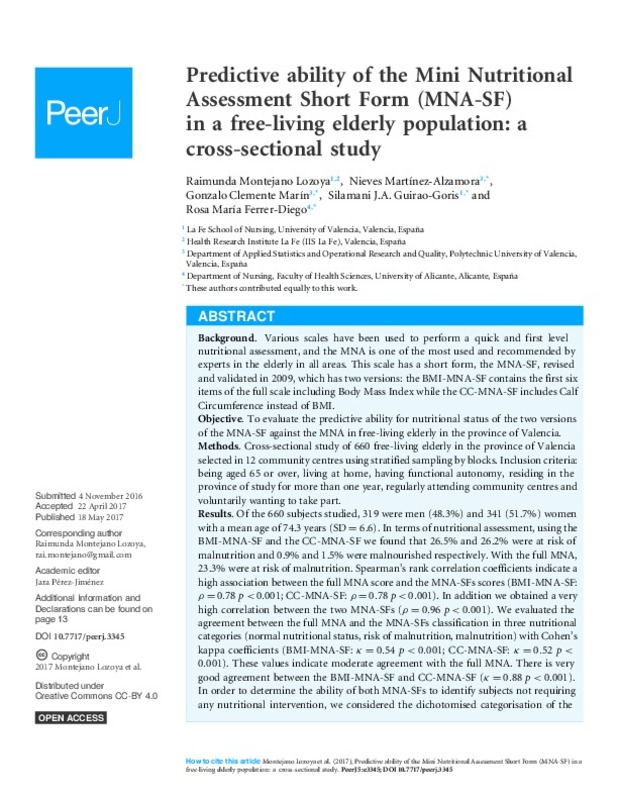JavaScript is disabled for your browser. Some features of this site may not work without it.
Buscar en RiuNet
Listar
Mi cuenta
Estadísticas
Ayuda RiuNet
Admin. UPV
Predictive ability of the Mini Nutritional Assessment Short Form (MNA-SF) in a free-living elderly population: a cross-sectional study
Mostrar el registro sencillo del ítem
Ficheros en el ítem
| dc.contributor.author | Montejano Lozoya, Raimunda
|
es_ES |
| dc.contributor.author | Martínez Alzamora, Mª Nieves
|
es_ES |
| dc.contributor.author | Clemente Marín, Gonzalo
|
es_ES |
| dc.contributor.author | Guirao-Goris, Silamani J.A.
|
es_ES |
| dc.contributor.author | Ferrer Diego, Rosa Mª
|
es_ES |
| dc.date.accessioned | 2018-06-21T04:23:45Z | |
| dc.date.available | 2018-06-21T04:23:45Z | |
| dc.date.issued | 2017 | es_ES |
| dc.identifier.uri | http://hdl.handle.net/10251/104450 | |
| dc.description.abstract | [EN] Background. Various scales have been used to perform a quick and first level nutritional assessment, and the MNA is one of the most used and recommended by experts in the elderly in all areas. This scale has a short form, the MNA-SF, revised and validated in 2009, which has two versions: the BMI-MNA-SF contains the first six items of the full scale including Body Mass Index while the CC-MNA-SF includes Calf Circumference instead of BMI. Objective. To evaluate the predictive ability for nutritional status of the two versions of the MNA-SF against the MNA in free-living elderly in the province of Valencia. Methods. Cross-sectional study of 660 free-living elderly in the province of Valencia selected in 12 community centres using stratified sampling by blocks. Inclusion criteria: being aged 65 or over, living at home, having functional autonomy, residing in the province of study for more than one year, regularly attending community centres and voluntarily wanting to take part. Results. Of the 660 subjects studied, 319 were men (48.3%) and 341 (51.7%) women with a mean age of 74.3 years (SD = 6.6). In terms of nutritional assessment, using the BMI-MNA-SF and the CC-MNA-SF we found that 26.5% and 26.2% were at risk of malnutrition and 0.9% and 1.5% were malnourished respectively. With the full MNA, 23.3% were at risk of malnutrition. Spearman's rank correlation coefficients indicate a high association between the full MNA score and the MNA-SFs scores (BMI-MNA-SF: rho = 0.78 p < 0.001; CC-MNA-SF: rho = 0.78 p < 0.001). In addition we obtained a very high correlation between the two MNA-SFs (rho = 0.96 p < 0.001). We evaluated the agreement between the full MNA and the MNA-SFs classification in three nutritional categories (normal nutritional status, risk of malnutrition, malnutrition) with Cohen's kappa coefficients (BMI-MNA-SF: kappa = 0.54 p < 0.001; CC-MNA-SF: kappa = 0.52 p < 0.001). These values indicate moderate agreement with the full MNA. There is very good agreement between the BMI-MNA-SF and CC-MNA-SF (rho = 0.88 p < 0.001). In order to determine the ability of both MNA-SFs to identify subjects not requiring any nutritional intervention, we considered the dichotomised categorisation of the full MNA and the MNA-SFs as "normal nutritional status'' vs. "malnutrition and risk of malnutrition'' Areas under the ROC curves using MNA as the gold standard indicate moderately high prognostic accuracy (BMI-MNA-SF: AUC = 0.88 p < 0.001; CC-MNA-SF: AUC = 0.87 p < 0.001). Both versions of the MNA-SF showed similar sensitivity, specificity and diagnostic effectiveness (BMI-MNA-SF: 73.4%, 86.6%, 83.5%; CC-MNA-SF 73.4%, 86.2%, 83.2%). Conclusions. In its two versions the MNA-SF presents useful predictive ability against the MNA. The advantage of the CC-MNA-SF is that using it requires fewer resources and less time in primary care, although always the characteristics of the population must take into account to make the right decision based on the MNA-SF scales. | es_ES |
| dc.language | Inglés | es_ES |
| dc.publisher | PeerJ | es_ES |
| dc.relation.ispartof | PeerJ | es_ES |
| dc.rights | Reconocimiento (by) | es_ES |
| dc.subject | Nutritional assessment | es_ES |
| dc.subject | MNA-SF | es_ES |
| dc.subject | Free-living elderly | es_ES |
| dc.subject.classification | ESTADISTICA E INVESTIGACION OPERATIVA | es_ES |
| dc.title | Predictive ability of the Mini Nutritional Assessment Short Form (MNA-SF) in a free-living elderly population: a cross-sectional study | es_ES |
| dc.type | Artículo | es_ES |
| dc.identifier.doi | 10.7717/peerj.3345 | es_ES |
| dc.rights.accessRights | Abierto | es_ES |
| dc.contributor.affiliation | Universitat Politècnica de València. Departamento de Estadística e Investigación Operativa Aplicadas y Calidad - Departament d'Estadística i Investigació Operativa Aplicades i Qualitat | es_ES |
| dc.description.bibliographicCitation | Montejano Lozoya, R.; Martínez Alzamora, MN.; Clemente Marín, G.; Guirao-Goris, SJ.; Ferrer Diego, RM. (2017). Predictive ability of the Mini Nutritional Assessment Short Form (MNA-SF) in a free-living elderly population: a cross-sectional study. PeerJ. 5(e3345):1-17. doi:10.7717/peerj.3345 | es_ES |
| dc.description.accrualMethod | S | es_ES |
| dc.relation.publisherversion | https://doi.org/10.7717/peerj.3345 | es_ES |
| dc.description.upvformatpinicio | 1 | es_ES |
| dc.description.upvformatpfin | 17 | es_ES |
| dc.type.version | info:eu-repo/semantics/publishedVersion | es_ES |
| dc.description.volume | 5 | es_ES |
| dc.description.issue | e3345 | es_ES |
| dc.identifier.eissn | 2167-8359 | es_ES |
| dc.identifier.pmid | 28533984 | en_EN |
| dc.identifier.pmcid | PMC5438591 | en_EN |
| dc.relation.pasarela | S\337477 | es_ES |








